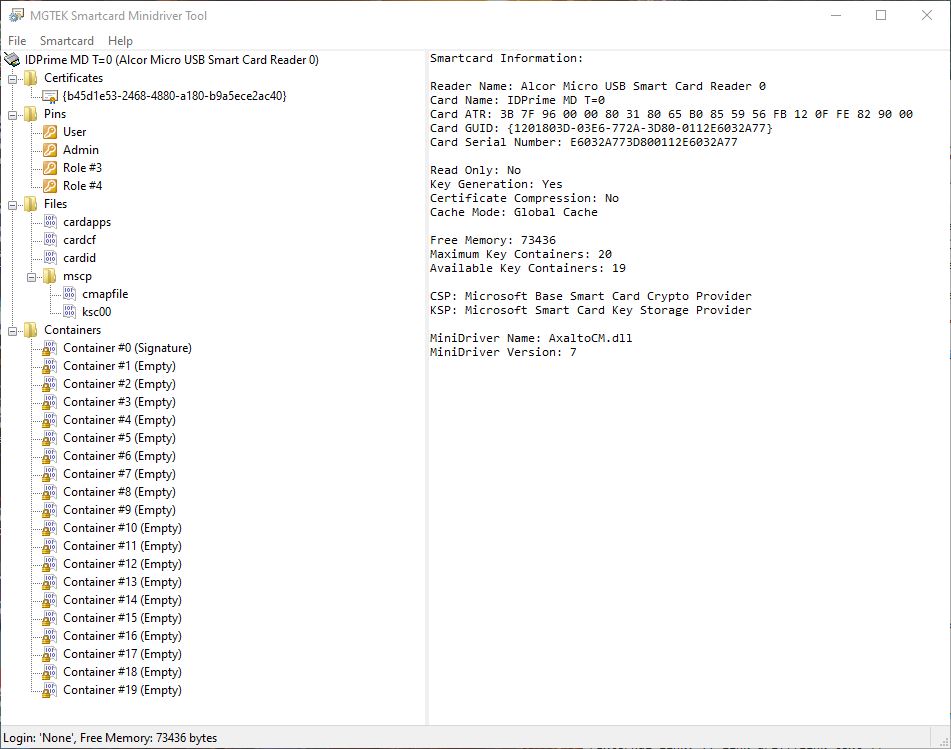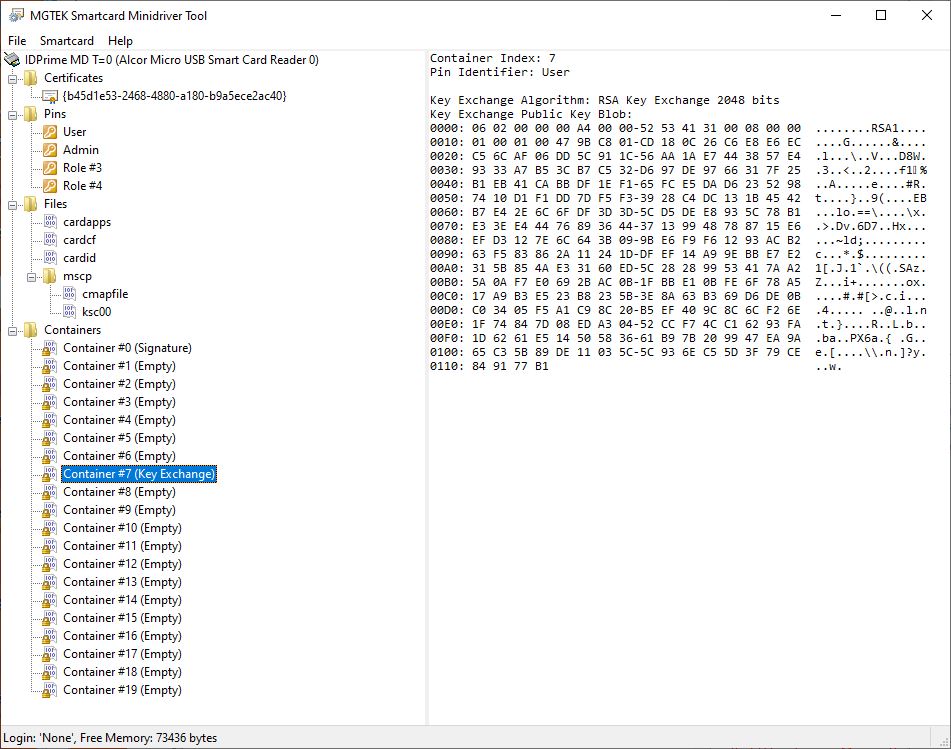|
|
(Visual FoxPro) ScMinidriver - Import Private Key to Smart Card
Demonstrates how to import a private key to the "signature" or "key exchange" location in the Nth key container on a smart card.
LOCAL loPrivKey
LOCAL lnSuccess
LOCAL loScmd
LOCAL lcReaderName
LOCAL lcPinId
LOCAL lnRetval
* This example requires the Chilkat API to have been previously unlocked.
* See Global Unlock Sample for sample code.
* Chilkat recommends the following free tool for interactively examining the contents of your smart card
* through the ScMinidriver interface: MGTEK Tool for Minidriver enabled Smart Cards
* Let's first look at our smart card before importing a private key.
* Here's the view of our Gemalto (Thales) IDPrime MD T=0 smart card in the MGTEK tool:
 * First let's load a private key into the Chilkat private key object.
* (Chilkat provides the ability to load private keys from many different sources and formats.
* this example loads from a PEM file.)
* For versions of Chilkat < 10.0.0, use CreateObject('Chilkat_9_5_0.PrivateKey')
loPrivKey = CreateObject('Chilkat.PrivateKey')
lnSuccess = loPrivKey.LoadPemFile("qa_data/rsa/rsaPrivKey_pkcs8.pem")
IF (lnSuccess = 0) THEN
? loPrivKey.LastErrorText
RELEASE loPrivKey
CANCEL
ENDIF
* For versions of Chilkat < 10.0.0, use CreateObject('Chilkat_9_5_0.ScMinidriver')
loScmd = CreateObject('Chilkat.ScMinidriver')
* First we need to acquire a context to the smart card in the reader where it is inserted.
* Reader names (smart card readers or USB tokens) can be discovered
* via List Readers or Find Smart Cards
lcReaderName = "Alcor Micro USB Smart Card Reader 0"
lnSuccess = loScmd.AcquireContext(lcReaderName)
IF (lnSuccess = 0) THEN
? loScmd.LastErrorText
RELEASE loPrivKey
RELEASE loScmd
CANCEL
ENDIF
* If successful, the name of the currently inserted smart card is available:
? "Card name: " + loScmd.CardName
* To import a private key, we'll need to be PIN authenticated.
* For more details about smart card PIN authentication, see the Smart Card PIN Authentication Example
lcPinId = "user"
lnRetval = loScmd.PinAuthenticate(lcPinId,"0000")
IF (lnRetval <> 0) THEN
? "PIN Authentication failed."
loScmd.DeleteContext()
RELEASE loPrivKey
RELEASE loScmd
CANCEL
ENDIF
* Let's import into the "key exchange" position in key container #7.
lnSuccess = loScmd.ImportKey(7,"kex",loPrivKey,"user")
IF (lnSuccess = 0) THEN
? "PIN Authentication failed."
loScmd.DeleteContext()
RELEASE loPrivKey
RELEASE loScmd
CANCEL
ENDIF
loScmd.DeleteContext()
? "Success."
* Here's the MGTEK view of the smart card after importing the private key:
* First let's load a private key into the Chilkat private key object.
* (Chilkat provides the ability to load private keys from many different sources and formats.
* this example loads from a PEM file.)
* For versions of Chilkat < 10.0.0, use CreateObject('Chilkat_9_5_0.PrivateKey')
loPrivKey = CreateObject('Chilkat.PrivateKey')
lnSuccess = loPrivKey.LoadPemFile("qa_data/rsa/rsaPrivKey_pkcs8.pem")
IF (lnSuccess = 0) THEN
? loPrivKey.LastErrorText
RELEASE loPrivKey
CANCEL
ENDIF
* For versions of Chilkat < 10.0.0, use CreateObject('Chilkat_9_5_0.ScMinidriver')
loScmd = CreateObject('Chilkat.ScMinidriver')
* First we need to acquire a context to the smart card in the reader where it is inserted.
* Reader names (smart card readers or USB tokens) can be discovered
* via List Readers or Find Smart Cards
lcReaderName = "Alcor Micro USB Smart Card Reader 0"
lnSuccess = loScmd.AcquireContext(lcReaderName)
IF (lnSuccess = 0) THEN
? loScmd.LastErrorText
RELEASE loPrivKey
RELEASE loScmd
CANCEL
ENDIF
* If successful, the name of the currently inserted smart card is available:
? "Card name: " + loScmd.CardName
* To import a private key, we'll need to be PIN authenticated.
* For more details about smart card PIN authentication, see the Smart Card PIN Authentication Example
lcPinId = "user"
lnRetval = loScmd.PinAuthenticate(lcPinId,"0000")
IF (lnRetval <> 0) THEN
? "PIN Authentication failed."
loScmd.DeleteContext()
RELEASE loPrivKey
RELEASE loScmd
CANCEL
ENDIF
* Let's import into the "key exchange" position in key container #7.
lnSuccess = loScmd.ImportKey(7,"kex",loPrivKey,"user")
IF (lnSuccess = 0) THEN
? "PIN Authentication failed."
loScmd.DeleteContext()
RELEASE loPrivKey
RELEASE loScmd
CANCEL
ENDIF
loScmd.DeleteContext()
? "Success."
* Here's the MGTEK view of the smart card after importing the private key:
 RELEASE loPrivKey
RELEASE loScmd
RELEASE loPrivKey
RELEASE loScmd
|

